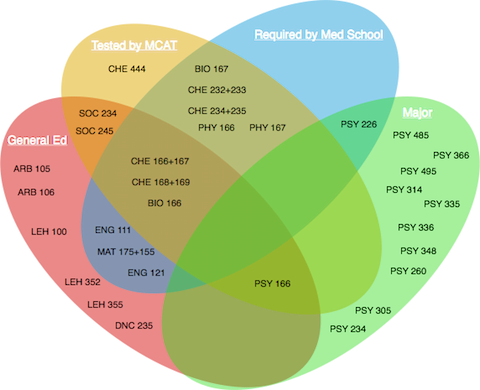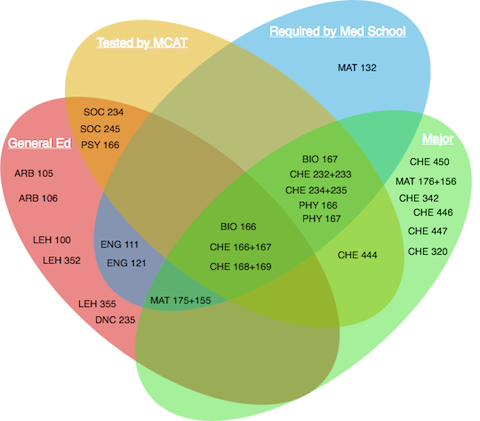Choosing Courses and a Major
- Does the Major Matter?
- What About Bachelor of Arts vs. Bachelor of Science?
- Planning the Program of Study
How Professional Schools Think About Majors
Imagine you’re a student in the third year of medical school. You’re starting to go on rounds, seeing patients. With you is a doctor and a bunch of other medical students. You learn from the doctor, sure, but you also learn from each other.
Everyone in the group has had the same core set of courses: a year of biology, two and a half years of chemistry, a year of physics, a year of English, some psychology and sociology. But they’ve majored in different things, meaning that they’ve gained specialized expertise on top of that core.
The first patient you see has a fungal infection that had been mutating, resisting treatments. Someone who has majored in Biology may have additional insight to share with the group.
The next patient is in the hospital with tuberculosis for the third time, because they have not been conscientious about taking their prescription antibiotics. This is not a biological question. But someone who majored in Psychology may have additional insight. Or, if there is a cultural element, a Sociology or Anthropology major might have valuable contributions.
And then there’s a patient who is under 18, but has some aspect of her diagnosis that she does not want shared with her parents. This raises ethical questions, which a Philosophy major is likely to have thought about.
A similar mix of issues are faced by students in every one of the health professions. The physical therapy patient who wants to know how to prevent injuries in the future is asking an Exercise Science question, for example, while one who wants to know about modifications to their wheelchair is asking about Physics.
For that reason, professional schools want to have students from a mix of different majors.
It’s like a professional sports team. Does a baseball team “prefer” drafting pitchers, or catchers, or outfielders? The answer, of course, is that it depends on what that particular team needs. Everyone has to have some core skills in common (being able to throw the baseball accurately and far, for instance), but then each position has specialized skills beyond that core.
So how should you decide on your major?
Here are some factors to consider:
- If you enjoy a major, you may have an easier time getting good grades in it, which will help your G.P.A.
- The requirements for some majors, notably Biology, Chemistry, Anthropology/Biology/Chemistry, and Exercise Science, overlap to a high degree with the prerequisite courses needed to apply to professional schools in medicine and allied fields, making it easier to fulfill all requirements simultaneously
- Some majors at Lehman can help you get internship experience
- Majors which are unusual for pre-health students can help you stand out
- Your major is also part of your backup plan. If you don't get in to the professional field of your choice, or change your mind about pursuing it, what are your new options?
In short, there isn't a single right answer as to what makes a good choice of major. In fact, the second and fourth bullet points above are in conflict; the majors that stand out more do so in part because they have less overlap with the pre-health requirements.
The best advice then, is to consider your choices for major and put some thought in to the choice.
What About Bachelor of Arts vs. Bachelor of Science?
As far as professional schools are concerned, there is no difference between a B.A. and a B.S..
Why then, are there two different kinds of degrees?
Until the middle of the 19th century, the term "arts" covered all of what we now think of as college subjects, including the humanities, the natural sciences, and the fine arts. Thus, bachelors degrees in all of those fields were generally bachelors of arts (B.A.). College degrees in those days usually meant people had an education that was broad as well as deep. That's still true today, of course; Lehman's general education requirements are one way of assuring that students who hold a bachelor's degree from Lehman have a well-rounded education.
In the late 19th century, there was felt to be a need for a degree that was still well-rounded, but allowed somewhat more focus, particularly for those students who were going directly from the bachelor's degree to the workforce. This new degree, the bachelor of science (B.S.), still required students to be well-rounded, but sacrificed some of that breadth for an increased courseload within the field of study. This was particularly well-suited to fields such as engineering and nursing.
For other fields, such as the natural sciences, the decision whether to offer them as a B.A. or a B.S. was less clear. Some colleges continued to offer those degrees only as a B.A.. Others switched some or all of them to a B.S.. And in some cases, both a B.A. and a B.S. might be offered in a field.
Among Surgeon Generals of the United States, five have held B.A. degrees. Among Nobel Prize winners in the field of medicine/physiology, more than twenty received a B.A..
The bottom line is that either a B.S. or a B.A. are fine for pursuing a professional degree, and professional schools have no preference for one over the other. You should never choose your major on the basis of whether it is awarded as a B.A. or a B.S..
Planning the Program of Study
Regardless of your major or minor, preparing for professional school takes planning. You've got to juggle the requirements for your major, Lehman's general education requirements, the courses required by your professional track, and any courses you might need which will help you prepare for exams such as the MCAT, DAT, PCAT, etc.. In order to graduate in four years and satisfy financial aid requirements, it is important to find courses which fit in to more than one of those areas when possible. As an example, consider someone who wishes to major in psychology and then head to medical school. Their course choices might look like this:

This is just an example and not a guide
There are many options available, so you should work with advisors to see what is best for you. The example demonstrates how a single course can fulfill more than one requirement. PSY 166, for instance, fulfills a Lehman general education requirement and a requirement for the major, and covers material which is on the MCAT.
Here is a similar diagram for a major in chemistry (biochemistry concentration) who is also pre-med:

To Gap or Not to Gap
A "gap year" is a year between completing your undergraduate degree and beginning medical school. Taking a gap year has the following benefits:
- Allows more time to complete coursework necessary for admissions exams such as the MCAT, DAT, PCAT, and OAT
- Often results in a higher science GPA at time of application
- Full-time work during the gap year can allow money to be saved for use during professional school
- Provides a break from schooling!
If a gap year is not taken, admissions exams must be taken by the summer after junior year, meaning that courses covering the content of the exam should ideally be completed before then as well.
A Few Guildelines to Get You Started
While you should get advising as soon as possible, we understand that some of you might not find this page until the day of registration, and might need some quick advice. With that in mind, here are some tips:
- Once you know where you place in the mathematics sequence, follow it up through MAT 172 (precalculus) as soon as possible. Many of the other courses required for the pre-health curriculum require MAT 172 as at least a corequisite.
- Because many pre-health curricula require many semesters of chemistry in sequence, you should take CHE 166+167 as soon as possible. This is one of the courses for which MAT 172 is a corequisite, though.
- Lab courses represent a very heavy workload. You should never take more than two of the following courses in the same semester: BIO 166, 167; CHE 166+167, 168+169, 232+233, 234+235; PHY 166, 167. If you are unsure of your abilities in difficult science courses, start with only one of these courses per term (likely chemistry) until you understand what the workload is like and how to cope with it.
- CHE 168+169, PHY 166, and PHY 167 can be a blur if taken too quickly, and are therefore not recommended in the summer unless you are retaking the class or otherwise have prior exposure to the subject material.
Pre-Professional Course Requirements
Each of the eight pre-health tracks we support at Lehman requires a somewhat different set of courses, and within each track the requirements of individual schools also vary.
The links at the left under "The Eight Tracks" will list the courses required most commonly for each of the tracks. As you continue through your time at Lehman, you'll want to consult the website of individual schools you are interested in, as well as resources such as the books and databases of admissions requirements available in the pre-health advising office.








